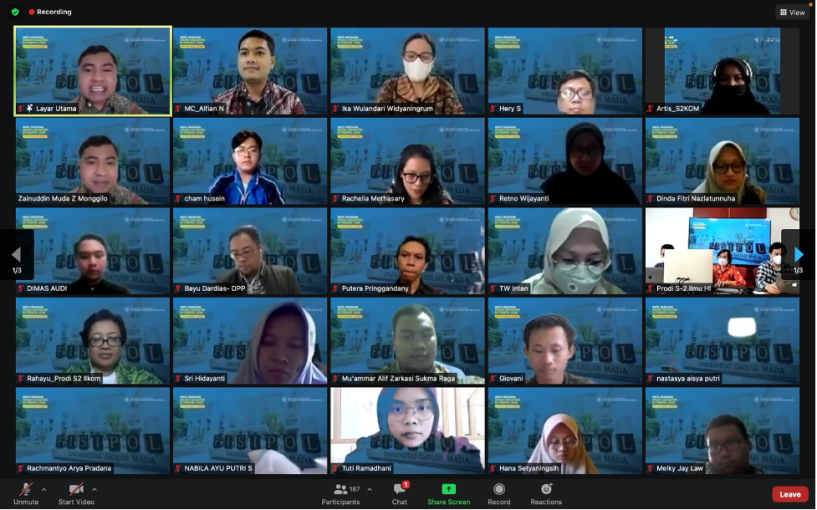
Yogyakarta, June 9th 2022─The Faculty of Social and Political Sciences (Fisipol) Universitas Gadjah Mada (UGM) held an Info Session “Master’s Study Program of Fisipol UGM” on Thursday (9/6). This socialization was attended by seven master study programs at Fisipol UGM, namely Masters in Politics and Government, Masters in Communication Studies, Masters in Sociology, Masters in International Relations, Masters in Public Administration, and Masters in Public Policy Management.
The event, which took place through the Zoom Meeting, was attended by around 200 new student participants for the master’s program. The Dean of Fisipol UGM, Wawan Mas’udi, gave a speech by introducing the profile of Fisipol as the most progressive faculty.
“We are very progressive in developing fields, special interests, as well as curricula that we see are increasingly relevant to current and future developments, without forgetting what was our foundation in the past,” Wawan said.
The socialization of the introduction of the study program was delivered by the representative of the head of the master’s study program. Among them were Dr. Bayu Dardias, Dr. Rahayu, Dr. Desintha Dwi Asriani, Suzanna Eddyono, PhD, Dr. Muhammad Rum, Dr. Ely Susanto, MBA., Dr. Subando Agus Margono.
Beginning with a Masters in Politics and Governance which has five concentrations, namely Indonesian Politics, Local Politics and Regional Autonomy, Human Rights and Democracy, Election Governance, and Natural Resources Politics. This study program is in collaboration with CitRes-Edu in Norway, where students have the opportunity to exchange to Norway for one semester with scholarships.
Then, the Master of Communication Studies also has three specializations, namely Communication Management, Media and Cultural Studies, and Digital Media and Communication. Dr. Rahayu said that the uniqueness of this study program is that it has two learning paths. First, the lecture-based master’s path where the lecture weight is greater and is scientifically oriented. Second, a research-based master’s path that emphasizes research activities and scientific publications.
Followed by the Master of Sociology study program which is divided into three concentrations, namely Media and Digital Humanities, Identity and Citizenship, and Sociology and Social Policy. In addition to lectures, the Master of Sociology offers supporting programs to improve the quality of the students themselves. These include: International Joint Courses UGM-Melbourne, Public Lecture, Mentorship and Academic Engagement, workshops and seminars, as well as collaborative research and publication-based activities.
Meanwhile, the Masters Program in Social Development and Welfare (PSdK) offers two specializations, namely Regular and CSR (Corporate Social Responsibility). The research aspect of the Sociology study program is quite developed because it has a SODEC (Social Development Studies Center) study center which provides space for students to participate in various researches. There are research grants, publications, and conferences for students from faculties and study programs every year.
Meanwhile the Master of International Relations has four areas of competence, namely Diplomatic Affairs, Academics, Transnational Affairs, and Journalism. This study program also offers scholarship opportunities in collaboration with the Ministry of Communication and Information and the Forbil Institute. The general principle of this study program is to increase the quality and quantity of research and publications, develop more inclusive types of education, as well as improve the quality of teaching and learning activities and develop partnerships.
Furthermore, the Master of Public Administration has two concentrations, namely Public Governance and Digital Governance. Alumni of this study program are expected to have at least the skills to make policy briefs, make policy papers, understand business processes and also performance indicators. The last is the Master of Public Policy Management (MKP) which provides competency strengthening, especially in organizational management and management in the public, private, and private spheres. This study program also prepares the formulation of public policy so that there are also soft skills programs such as problem solving, research methods, leadership, and management of public issues.
